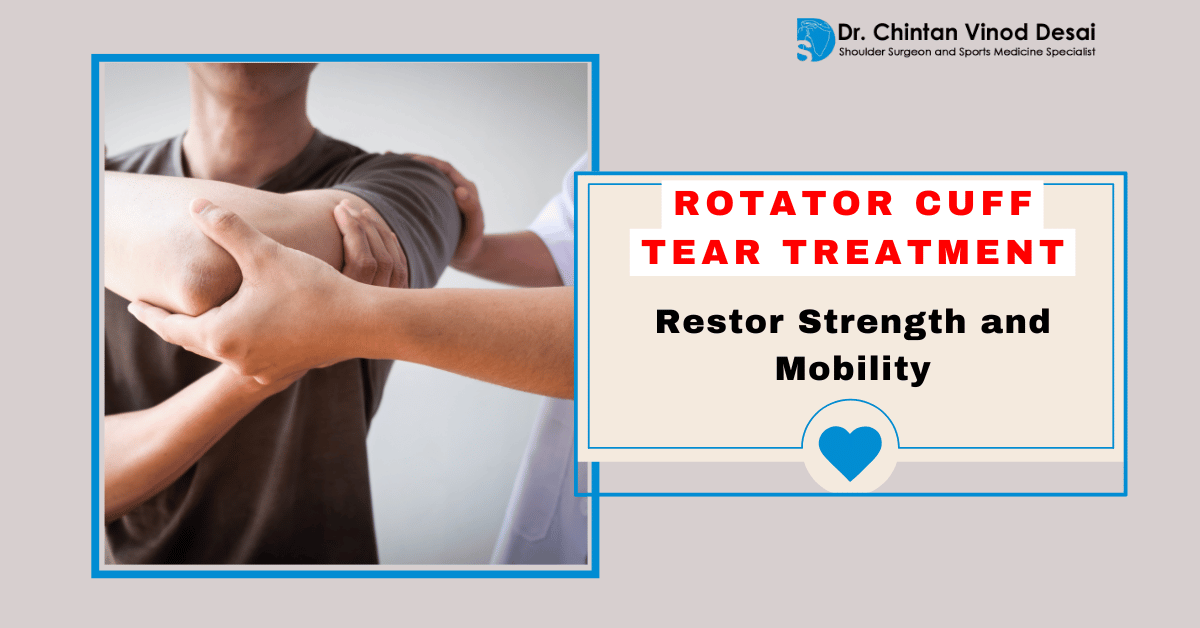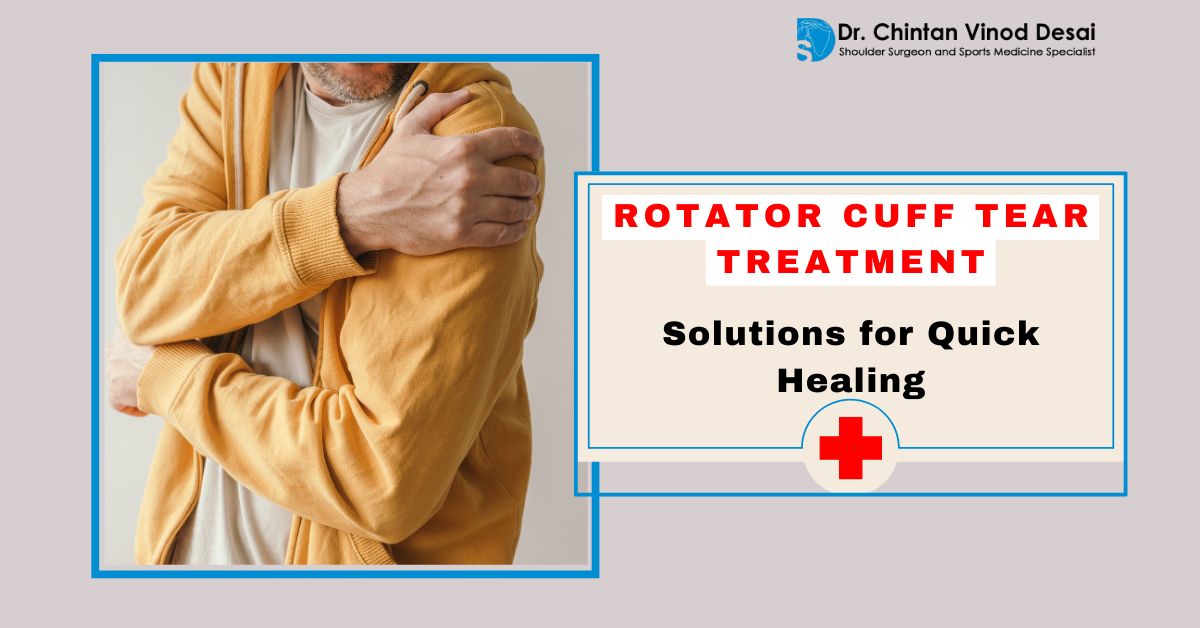Rotator Cuff Tear Treatment
A rotator cuff tear can turn everyday tasks into painful struggles. Lifting your arm, reaching behind your back, or even sleeping on your side might feel impossible.
Rotator cuff injuries are common, especially among active adults, athletes, and older individuals.
This blog covers how to identify rotator cuff tears, understand treatment options, and regain shoulder function and strength.
We’ll explore both surgical and non-surgical treatments, when to seek help, and tips for a smoother recovery.
What Is a Partial tear?
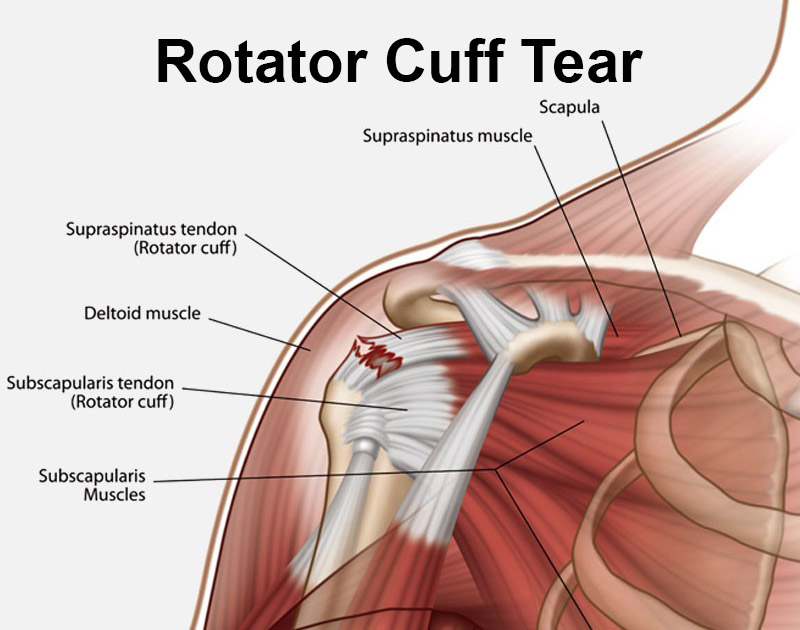
The rotator cuff is a group of four muscles and tendons that stabilize your shoulder joint.
These tendons help you lift and rotate your arm. When one or more of them tear, your shoulder loses strength and mobility.
There are two main types:
- Partial tear – the tendon is damaged but not completely severed
- Complete tear – the tendon is fully torn or pulled off the bone
Common causes include:
- Repetitive overhead motions (e.g., sports or jobs)
- Sudden trauma or falls
- Age-related degeneration
Symptoms often include:
- Pain when lifting or lowering the arm
- Weakness in the shoulder
- A cracking sensation or limited range of motion
- Night pain, especially when sleeping on the affected side
When Should You See a Doctor?
Mild discomfort can be managed with rest. But you should see a doctor if:
- Pain lasts more than a week
- You notice weakness when lifting objects
- You can’t move your shoulder normally
- Pain disrupts your sleep
Early diagnosis helps avoid long-term damage and speeds up recovery.
Diagnosis: How Is a Rotator Cuff Tear Identified?
Your doctor may begin with a physical exam to assess your shoulder strength and motion.
Imaging tests are often needed:
- X-rays rule out bone spurs or arthritis
- Ultrasound helps assess the tendons in real time
- MRI shows detailed images of soft tissues and helps confirm the tear size and location
This evaluation helps guide treatment planning.
Non-Surgical Treatment Options
Not all rotator cuff tears require surgery. For small or partial tears, the following options can help:
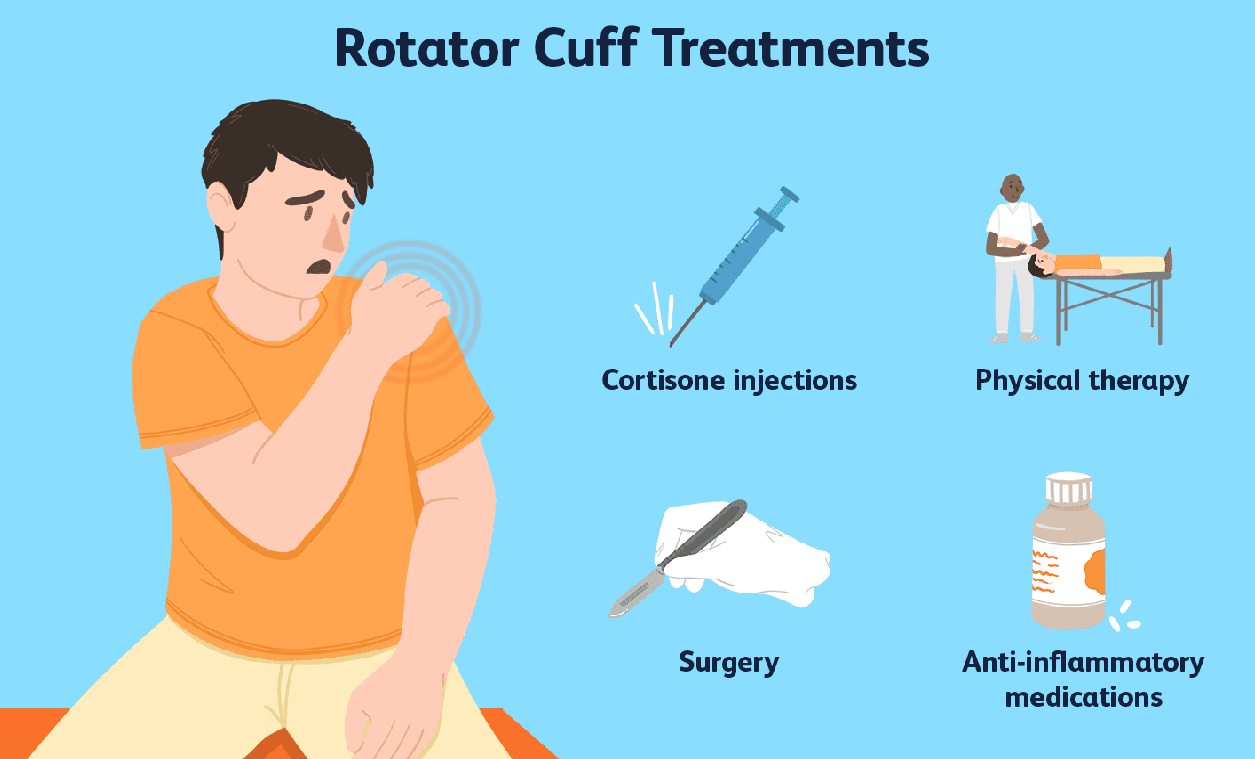
1. Rest and Activity Modification
Avoid overhead movements or lifting. Use a sling if needed for comfort.
2. Physical Therapy
A customized rehab plan focuses on strengthening shoulder muscles and improving flexibility.
3. Medications
Over-the-counter pain relievers like ibuprofen or paracetamol reduce inflammation and discomfort.
4. Corticosteroid Injections
Useful for short-term pain relief in more inflamed cases. These are not a long-term solution but can provide comfort to start physical therapy.
With consistent care, many patients regain function without surgery.
When Surgery Becomes Necessary
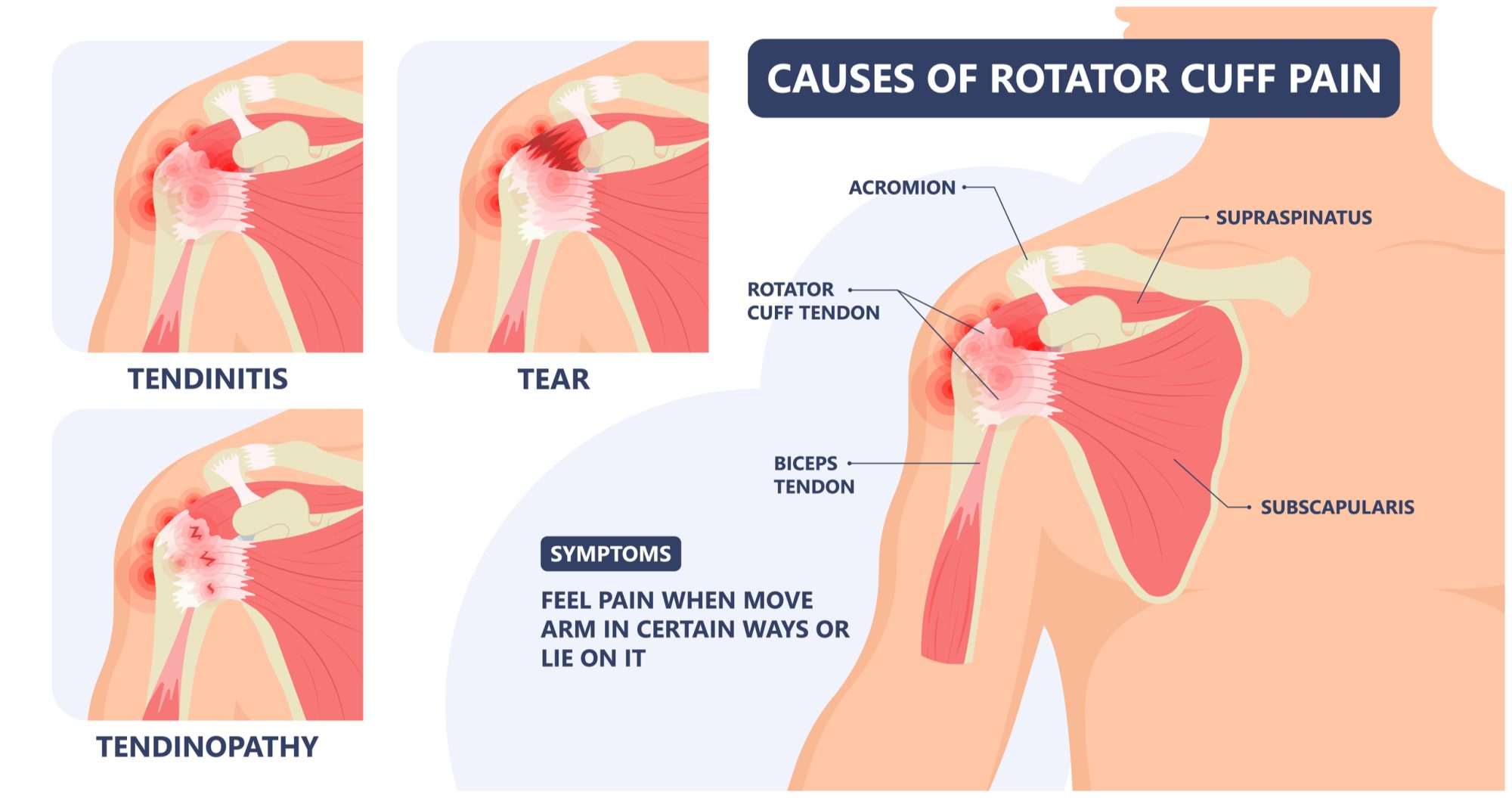
If symptoms persist despite therapy, or if the tear is large and affects your quality of life, surgery may be the next step.
Surgical repair helps:
- Reattach the torn tendon to the bone
- Restore shoulder strength and range of motion
- Prevent further degeneration of the joint
Common procedures include:
- Arthroscopic Repair: Minimally invasive, using small incisions and a camera
- Open Repair: Traditional method for larger or complex tears
- Tendon Transfer: Used when the tendon is too damaged to repair
- Shoulder Replacement: For severe damage and arthritis
The choice depends on the size of the tear, your age, and your activity level.
Recovery and Rehabilitation
Recovery after surgery can take several months. Here’s what to expect:
1. Initial Healing (First 4-6 Weeks)
- Shoulder is immobilized in a sling
- Avoid active use of the arm
- Gentle passive movements may begin
2. Intermediate Phase (6–12 Weeks)
- Gradual introduction of stretching and strength exercises
- Supervised physiotherapy sessions
3. Final Phase (3–6 Months)
- Focus on restoring strength and full range of motion
- Return to work and sports activities based on progress
Following your rehab plan closely is key for the best outcome.
Prevention Tips
Rotator cuff injuries often develop over time. Here are simple habits to protect your shoulders:
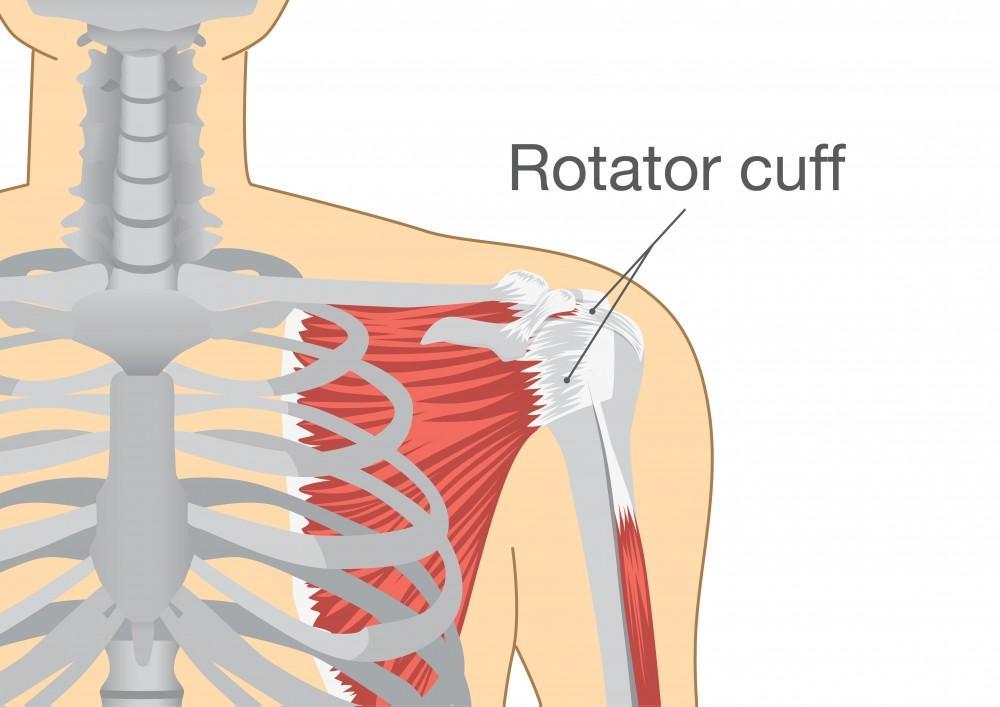
- Warm up before physical activity
- Avoid repeated overhead movements
- Strengthen shoulder and back muscles regularly
- Practice good posture, especially if you sit for long periods
- Listen to your body and rest when needed
These habits help reduce the risk of future injuries.
Dr. Chintan Vinod Desai is a consulting shoulder surgeon practicing across Tardeo, Parel, Dadar, Mumbai Central, Lalbaug, Santacruz, and Mulund, Mumbai.
He specializes in advanced shoulder treatments and has expertise in shoulder conditions such as rotator cuff tears, frozen shoulder, instability, impingement, calcific tendonitis, and shoulder arthritis. Dr. Desai is known for applying the latest surgical techniques to help patients regain mobility and lead pain-free lives.
FAQs
1. Can a rotator cuff tear heal without surgery?
Yes, small or partial tears often improve with rest, physical therapy, and pain management. Surgery is only needed if symptoms don’t improve.
2. How long is the recovery after rotator cuff surgery?
Recovery varies but usually takes 4 to 6 months. Complete healing and return to full strength can take up to a year.
3. Is rotator cuff surgery painful?
Some discomfort is expected, especially in the first few weeks. Pain is managed with medications and usually decreases as healing progresses.
4. Can I still exercise with a rotator cuff tear?
Low-impact exercises may be okay, but avoid activities that strain the shoulder. Always follow your doctor’s advice.
5. What happens if a rotator cuff tear is left untreated?
The tear can worsen over time, leading to chronic pain, muscle loss, and reduced mobility. Early treatment prevents complications.
Conclusion
Rotator cuff tears can affect your independence and quality of life.
The good news is that with proper treatment—whether conservative or surgical—you can regain strength, mobility, and comfort.
If you’re struggling with shoulder pain or weakness, don’t ignore it.
Consult a shoulder specialist like Dr. Chintan Vinod Desai to get the right diagnosis and a tailored treatment plan.
Your shoulder deserves the care it needs to help you move freely again.

